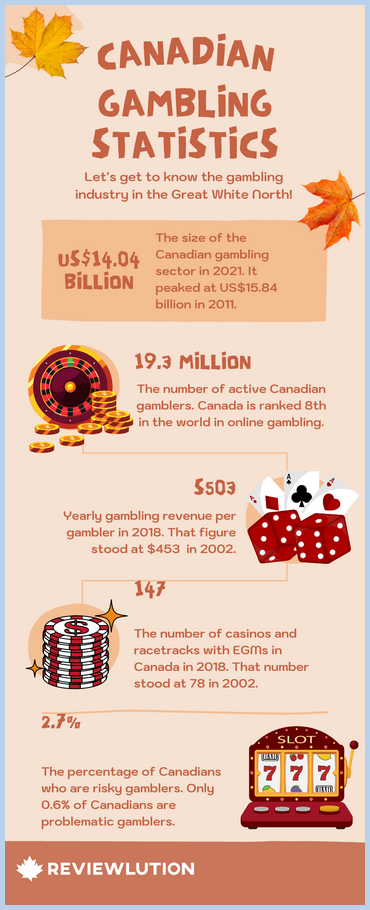Gambling is a popular pastime in Canada, with approximately 75% of the population engaging in some form of wagering, whether it's playing the lottery, betting on sports, or visiting casinos. Despite this high participation rate, the Canadian gambling industry is well-regulated, and the number of participants is relatively low compared to other countries.
Key Highlights
● The online gambling market in Canada is expected to see user penetration increase to 51% by 2027.
● The average revenue per user (ARPU) in Canada's online gambling industry is $220.
● In 2018, sports betting accounted for 7.9% of gambling activities in Canada.
● Non-regulated businesses generated 57% of sports betting revenue in 2019.
● Lottery tickets were the most popular form of gambling in Canada, with 65% of regular gamblers participating.
● In 2018, electronic gaming machines were equally popular among male (12%) and female (13%) Canadians.
● According to the Canadian Community Health Survey, only 2% of Canadians over the age of 15 have a gambling problem.
● The market size of Canada's gambling sector decreased to $12.54 billion in 2021.
The Financial Impact of Gambling on Canadians
In 2017, the average gambling loss per person in Canada was $568. Ontario, with its large population of gamblers, saw the highest revenue and losses, followed by British Columbia and Quebec. Let's delve into the statistics that contributed to these losses among Canadian gamblers.
The Rise of Online Gambling
Online gambling offers bettors a world of opportunities without the constraints of physical locations. The convenience, affordability, and higher return on investment make online gambling an attractive option for many Canadians. The most popular online gambling activities include:

● Lottery games
● Casino games (e.g., poker and blackjack)
● Sports betting (e.g., football and horse racing)
The following statistics highlight the growth and impact of Canada's online gambling industry:
1. By 2027, user penetration in the online gambling market in Canada is projected to reach 51%, up from 47% in 2024. This translates to an expected 20.38 million users by 2027, indicating a shift in preference from physical venues to online platforms.
2. In 2022, online casinos boasted a 97% overall return rate on winnings, significantly higher than the 61% return rate of physical casinos.
3. The total annual revenue of online casinos is expected to grow at a rate of 7.96% by 2027, reaching 3.3 billion US dollars.
4. The online casino market in Canada has the highest projected user penetration rate at 34%, with popular platforms including Bodog, Bet365, LeoVegas, Jackpot City, Woo Casino, and Spin Casino.
5. In 2022, casino games for smartphones and tablets reached 12.78 million downloads, with slot machines being the most popular type of online casino game among Canadians.
6. The total annual revenue from casino games is projected to grow by 7.30% from 2024 to 2027, with the market volume expected to reach 417.5 million US dollars by 2027.
7. The online gambling industry in Canada has an average revenue per user (ARPU) of $220, representing the amount of revenue generated per online gambler.
8. During the COVID-19 lockdowns, 17% of respondents in a gambling survey migrated to online gambling methods, contributing to the growth of the online gambling sector.
Sports Betting: A Growing Market
Sports betting was legalized in Canada in 1985 and, while not the most popular form of gambling in the country, it has significant growth potential. Let's examine the numbers that support this:

1. In 2018, 12% of male Canadians were more involved in sports betting, compared to only 4% of women.
2. Sports betting accounted for 7.9% of gambling activities in Canada in 2018.
|
Year |
Sports Betting Revenue |
|
2003 |
$450 million |
|
2024 (projected) |
$1.5 billion – $2.4 billion |
The sports betting industry in Canada has grown significantly over the past two decades, with revenue expected to reach between $1.5 billion and $2.4 billion by the end of 2024, up from just $450 million in 2003. This growth can be attributed to the increasing interest among citizens and easier access to the sports betting industry, particularly online.
1. Ontario closed its fiscal quarter with a 91% increase in total wagers after launching its retail gaming market in 2022, allowing private operators to create sports-betting spaces for locals. By December 31, 2022, total wagers amounted to more than $11.5 billion, even before the Super Bowl, when the industry typically sees the highest number of bets.
2. In 2019, non-regulated online businesses accounted for 57% of sports betting revenue, while legal "land-based" businesses generated 39%, and regulated online businesses contributed only 3%.
The Enduring Popularity of Offline Gambling
Despite the rise of online gambling, offline gambling remains popular in Canada, with at least 76% of Canadian adults participating in one or more forms of offline gambling in 2017. The most common types of offline gambling include:
● Bingo
● Lottery
● Raffle tickets
● Slot machines
● Electronic gambling machines
● Casino table games (e.g., blackjack and poker)
The following statistics highlight the continued popularity of offline gambling in Canada:
1. Lottery tickets are the most popular form of offline gambling in the country, with a participation rate of 65% among Canadian gamblers.
2. In Canada, lottery tickets (55%) and casino table games (10%) were more popular among males than females (48% and 5%, respectively).
3. Bingo was more prevalent among Canadian females (6%) than males (2%), reflecting the different emotional components of gambling between the genders.
4. In 2018, electronic gambling machines (EGMs) were almost equally popular among female (13%) and male (12%) Canadian gamblers.
5. Ontario had over 35% of the country's slot machines in 2019, with Canada boasting a total of over 67,000 slot machines across its land-based casinos. Ontario's high number of slot machines is unsurprising, given its status as one of the provinces with the highest gambling participation and revenue.
The Serious Side of Gambling: Addiction and Its Consequences
While only a small percentage of Canadians are considered problem gamblers, more than 300,000 individuals in the country develop severe or moderate-risk gambling-related issues. Let's explore the statistics and facts surrounding this critical aspect of gambling:
1. According to the Canadian Community Health Survey, only 2% of Canadians over the age of 15 have a gambling problem. Despite this seemingly low percentage, problem gambling remains a serious concern, as it can lead to bankruptcy, poor mental health, and crimes such as fraud, assault, and theft.
2. In 2022, 2.5% of male past-year gamblers were at moderate-to-severe risk of developing gambling problems, compared to 1.7% of female past-year gamblers. This discrepancy suggests that male gamblers are more invested in the industry and more susceptible to the sensation-seeking and thrilling aspects of gambling.

3. Gamblers from the lowest-income households, representing 53.8% of Canadian gamblers in 2021, are at a higher risk (2.7%) of developing moderate-to-severe gambling problems compared to those from the highest-income families (1.1%), who make up 71.5% of Canadian gamblers.
4. On average, gambling addicts in Canada often lose more than 500,000 US dollars per year. A 2013 study revealed that a highly problematic gambler in Canada lost 701,000 US dollars in a single year, placing bets at the same EGM venue 294 times with an average bet of $2,385 per visit.
5. Indigenous people in Canada have higher rates of gambling (72.4%) compared to non-Indigenous people (64.2%) and are more likely to be at a moderate-to-severe risk of becoming problem gamblers (4.5%).
6. In 2019, problem gamblers accounted for 31.6% of Canada's national gambling revenue, earning them the nickname "high-revenue" due to their significant contribution to the industry's income.
7. Approximately 2% of Canadians struggle with the effects of problem gambling, with those engaged in online gambling experiencing these effects four times more than those who gamble offline. The impact of problem gambling extends beyond the individual, affecting family members and friends as well.
8. Between 2002 and 2018, Canada saw a significant decrease in problematic gamblers, with 94% of male gamblers and 96% of female gamblers not at risk of developing gambling problems, thanks in part to the government's efforts to educate the population about responsible gambling.
The Growth of Canada's Gambling Market
Despite being well-regulated and having a relatively educated population regarding gambling, Canada's gambling industry continues to thrive due to the increased availability of legal gambling options. In 2021, the industry generated $2.64 billion in revenue.

1. Online gambling accounted for 45% of Canada's gambling industry revenue in 2021, amounting to $1.2 billion out of the total $2.64 billion. Online casinos are the primary contributors to the online gambling industry's revenue, reflecting the growing interest in online gambling among Canadians.
2. The market size of Canada's gambling sector amounted to $12.54 billion in 2021, a decrease from $12.75 billion in 2020 and $14.97 billion in 2019. Statista forecasts a continued decline, possibly due to Canadians turning to alternative, more affordable, and accessible entertainment options.
3. Canadians spent over $17 billion in domestic casinos and at least $4 billion on offshore online casinos, highlighting the significant financial impact of gambling on the country's economy.
4. Prior to the legalization of single-game sports betting in Canada in 2021, Canadians typically spent $10 billion on single sporting events illegally through black market operations organized by criminal networks. The legalization allows bettors to place wagers on individual sporting events legally, enabling the government to monitor this aspect of the industry and tax participants accordingly.
Conclusion
While the Canadian gambling industry may be smaller than that of other countries, with its market size projected to decline, this does not necessarily indicate a loss of interest among Canadians. Instead, the decline may be attributed to the emergence of alternative entertainment options.
Despite this, certain aspects of the Canadian gambling industry continue to flourish, particularly the online gambling sector, which experienced significant growth even before the COVID-19 pandemic. Looking ahead, it is plausible that online gambling will surpass traditional gambling in the coming years, given its current growth rate.

As Canada navigates the evolving landscape of its gambling industry, it remains crucial to prioritize responsible gambling practices, support those affected by problem gambling, and ensure that the industry operates in a fair and well-regulated manner.

